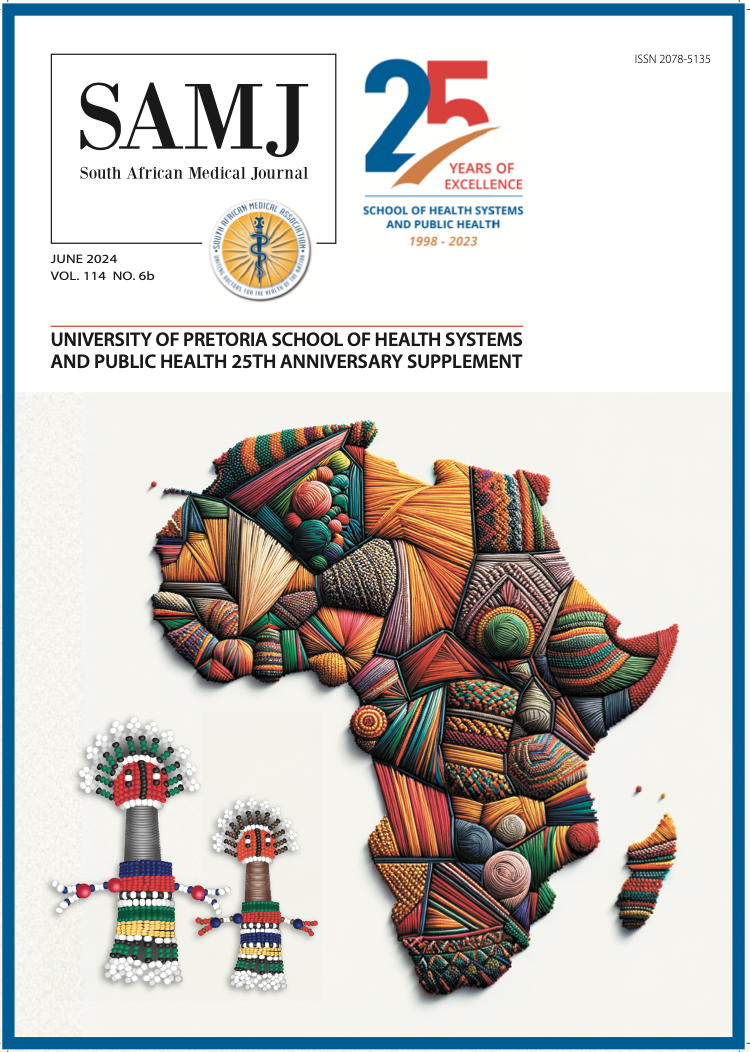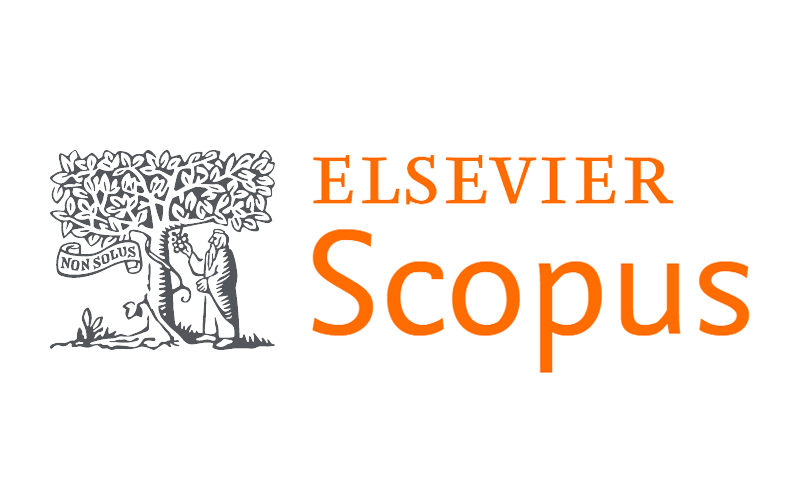Perceptions and views of key implementers on the implementation of the health-promoting school programme in the City of Tshwane, South Africa
DOI:
https://doi.org/10.7196/SAMJ.2024.v114i16b.1363Keywords:
health promoting schools, implementation, evaluation, health promotion, grounded theory, south africaAbstract
Background. The health-promoting school programme has been associated with numerous benefits for school communities where it is well implemented. In Tshwane, the implementation processes have not been evaluated.
Objective. A qualitative research approach based on grounded theory was used to investigate the experiences of 27 health-promoting school programme implementers across Tshwane.
Methods. Data were collected through a combination of methods, including semi-structured interviews with principals (n=6), educators (n=10) and school governing body members (n=4), one focus group discussion with health promoters (n=7), field notes from school observations and memos.
Results. Implementation fidelity was weak in the City of Tshwane, as a result of poor training of implementers, poor leadership and collaboration, weak accountability structures, and lack of resources and communication. A grounded theory was developed which showed that schools needed guidance and accountability to properly implement the programme. The theory offers a framework that could be used to improve implementation and evaluation outcomes.
Conclusion. Implementers were keen on improving the lives of learners – health-wise and academically. With proper guidance, support and accountability measures by government at district and provincial level, implementation of the programme is feasible in the City of Tshwane.
References
National Department of Health, South Africa. South African Non-Communicable Disease (NCD) Prevention Strategy (2020-2027). Pretoria: NDoH, 2022.
World Health Organization. WHO guideline on school health services. Geneva: WHO, 2021.
http://9789240029392-eng.pdf (accessed 2 March 2022).
World Health Organization & United Nations Children’s Fund (UNICEF). Investing in our future:
A comprehensive agenda for the health and well-being of children and adolescents. Geneva: WHO,
https://apps.who.int/iris/handle/10665/350239 (accessed 12 February 2023).
Dadaczynski K, Hering T. Health promoting schools in Germany. Mapping the implementation of holistic strategies to tackle NCDs and promote health. Int J Environ Res Public Health
;18(5):2623. https://doi.org/10.3390/ijerph18052623.
MacnabA.TheStellenboschconsensusstatementonhealthpromotingschools.GlobHealthPromot
;20(1):78-81. https://doi.org/10.1177/1757975912464252.
Hung TT, Chiang VC, Dawson A, Lee RL. Understanding of factors that enable health promoters in
implementing health-promoting schools: A systematic review and narrative synthesis of qualitative
evidence. PLoS ONE 2014; 29;9(9):e108284. https://doi.org/10.1371/journal.pone.0108284.
McIsaac JL, Mumtaz Z, Veugelers PJ, Kirk SF. Providing context to the implementation of health promoting schools: A case study. Evaluation and Program Planning 2015;53:65-71. https://doi.
org/10.1016/j.evalprogplan.2015.08.003.
Busch V, de Leeuw JR, Zuithoff NP, van Yperen TA, Schrijvers AJ. A controlled health promoting school study in the Netherlands: Effects after 1 and 2 years of intervention. Health Promot Pract 2015;16(4):592-600. https://doi.org/10.1177/1524839914566272.
Mashamba J, Mohamed S, Delobelle P, Onya H. Building competency for health promoting schools development in resource-limited settings: Case studies from South Africa. In: Mollaoglu M, ed. Health Promotion. Intech Open, 2022. http://doi.org/10.5772/intechopen.104863.
Dibakwane ST, Peu MD. Experiences of school health nurses regarding the provision of the school health service delivery in the Tshwane district. Afr J Prim Health Care Fam Med 2018;10(1):e1-e8. https://doi.org/10.4102/phcfm.v10i1.1807.
Stough LM, Lee S. Grounded theory approaches used in educational research journals. Int J Qualit Methods 2021;20(2):1-13. https://doi.org/10.1177/16094069211052203.
Hill J, Draper CE, de Villiers A, et al.Promoting healthy lifestyle behaviour through the Life-Orientation curriculum: Teachers’ perceptions of the HealthKick intervention. S Afr J Educ 2015;35(1):1-9. http://www.scielo.org.za/scielo.php?script=sci_arttext&pid=S0256- 01002015000100008&lng=en&tlng=en.
Mestry R. The role of governing bodies in the management of financial resources in South African no-fee public schools. Educ Manage Admin Leadership 2018;46(3):385-400. https://doi. org/10.1177/1741143216665838.
Creswell JW. Educational Research: Planning, Conducting, and Evaluating Quantitative and Qualitative Research, 4th ed. Boston: Pearson, 2012.
Sbaraini A, Carter SM, Evans RW, Blinkhorn A. How to do a grounded theory study: A worked example of a study of dental practices. BMC Med Res Methodol 2011;11:128. https://doi. org/10.1186/1471-2288-11-128.
Chong CH, Yeo KJ. An overview of grounded theory design in educational research. Asian Soc Sci 2015;11(12):258. https://doi.org/10.5539/ass.v11n12p258.
Lee A, Lo ASC, Keung MW, Kwong CMA, Wong K. Effective health promoting school for better health of children and adolescents: Indicators for success. BMC Public Health 2019;19:1088. https:// doi.org/10.1186/s12889-019-7425-6.
Bonde AH, Stjernqvist NW, Sabinsky MS, Maindal HT. Process evaluation of implementation fidelity in a Danish health-promoting school intervention. BMC Public Health 2018;18(1):1407. https://doi.org/10.1186/s12889-018-6289-5.
Molete M, Stewart A, Bosire E, Igumbor J. The policy implementation gap of school oral health programmes in Tshwane, South Africa: A qualitative case study. BMC Health Services Research 2020;20(1):338. https://doi.org/10.1186/s12913-020-05122-8.
RasesemolaRM,MatshogeGP,RamukumbaTS.CompliancetotheIntegratedSchoolHealthPolicy: Intersectoral and multisectoral collaboration. Curationis 2019;42(1):e1-e8. https://doi.org/10.4102/ curationis.v42i1.1912.
Clelland T, Cushman P, Hawkins J. Challenges of parental involvement within a health promoting school framework in New Zealand. Educ Res Int 2013;2013:1-7. https://doi.org/10.1155/2013/131636. 22. Mbatha AN, McCrindle CME, Shirinde J. Implementation fidelity of the health promoting school programme in primary schools in the City of Tshwane, Gauteng. Gender and Behaviour
;21(2):1-8. https://hdl.handle.net/10520/ejc-genbeh_v21_n2_a13
Fathi B, Allahverdipour H, Shaghaghi A, Kousha A, Jannati A. Challenges in developing health
promoting schools’ project: Application of global traits in local realm. Health Promot Perspect
;4(1):9-17. http://journals.tbzmed.ac.ir/HPP.
National Department of Education, South Africa. Integrated School Health Policy. Pretoria: NDoE,
Downloads
Published
Issue
Section
License
Copyright (c) 2024 N Mbatha, J Shirinde, C McCrindle

This work is licensed under a Creative Commons Attribution-NonCommercial 4.0 International License.
Licensing Information
The SAMJ is published under an Attribution-Non Commercial International Creative Commons Attribution (CC-BY-NC 4.0) License. Under this license, authors agree to make articles available to users, without permission or fees, for any lawful, non-commercial purpose. Users may read, copy, or re-use published content as long as the author and original place of publication are properly cited.
Exceptions to this license model is allowed for UKRI and research funded by organisations requiring that research be published open-access without embargo, under a CC-BY licence. As per the journals archiving policy, authors are permitted to self-archive the author-accepted manuscript (AAM) in a repository.
Publishing Rights
Authors grant the Publisher the exclusive right to publish, display, reproduce and/or distribute the Work in print and electronic format and in any medium known or hereafter developed, including for commercial use. The Author also agrees that the Publisher may retain in print or electronic format more than one copy of the Work for the purpose of preservation, security and back-up.





